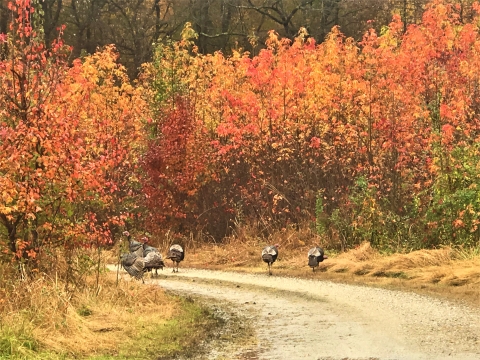Visit Us
Whether you're looking to walk, bike, drive, photograph, learn, hunt, fish, or just watch wildlife Occoquan Bay National Wildlife Refuge has opportunities for you. With 642 acres, the refuge has 4 miles of trails, an information center, interpretive kiosks, a photography blind, a gazebo, and two pavilions. Occoquan Bay National Wildlife Refuge offers something for every visitor!
Frequently Asked Questions
1. Do you charge a fee? - No, entrance is free!
2. Where can I bike? - Along all paved roads, wildlife drive, and the Potomac Heritage Trail
3. Can I bring my dog? - Pets are only allowed on the Potomac Heritage Trail. Pets are not allowed inside the gate on the refuge.
4. When is a good time to visit? - The best time to view wildlife is usually early in the morning, as soon as the refuge opens. Best seasons are spring and fall for migration times and for the best weather.
5. Can I bring a group or school? - Yes, however, the group must be participating in wildlife dependent recreation or education. If you'd like to bring a group of 10 or more please visit the special use permits page and scroll down to download the appropriate permit application. There is a $20 permit application fee that will need to be submitted to the Refuge unless told otherwise. Then email the application to christopher_wicker@fws.gov. Permit applications are reviewed to ensure the use will not negatively impact the wildlife or habitat.
6. When is the information center open? - Thursdays, Fridays and Saturdays 10am-4pm. Stop by to say hi, check out our book collection, or borrow a field guide and binoculars.
7. When is the refuge open? - 365 days a year, hours vary based on season. October 1-March 31 7am-5pm, April 1-September 30 7am-7pm
Know Before You Go
- Our gates shut automatically in the evening when the refuge closes. Refuge closed hours are times when wildlife have freedom to roam the refuge without fear of humans, please respect their space and make an effort to leave by closing time.
- Seasonal Weather
- Summer - Hot and humid. Drink fluids and use sunscreen while engaging in refuge activities.
- Spring and Fall - Mild and pleasant.
- Winter - mild with occasional cold, blustery winds across meadows and off the river.
- Staying Safe on the Trail
- Biting Insects – Use repellent when hiking during from April to October to deter mosquitoes, and biting flies.
- Ticks - Avoid walking through tall grasses and remember to stay on trails. Ticks may transmit disease; visitors are encouraged to check for ticks following a visit.
- Poison Ivy - All parts of the three leafed plant may result in skin rashes.
- Northern copperhead – To avoid the venomous snake, stay out of high grass and watch your step on trails.
Trails
A network of roads from the site’s military days forms the basis for the trails and a wildlife drive at Occoquan Bay National Wildlife Refuge.
Approximately 4 miles of flat, gravel roads are reserved for foot traffic only, and provide access to scenic views of forests, wetlands, and open water. These trails are accessible from the main parking lot. The wildlife drive is a one way, 2 mile loop that guides visitors through a variety of habitats within the refuge. This loop is open to foot traffic, vehicles and bicycles. The wildlife drive and walking trails are subject to seasonal closures to minimize stress on nesting and breeding wildlife or to facilitate land management activities.
Related Documents
Other Facilities in the Complex
Occoquan Bay National Wildlife Refuge is managed as part of the Potomac River National Wildlife Refuge Complex.
In 1998, Elizabeth Hartwell Mason Neck National Wildlife Refuge, Occoquan Bay National Wildlife Refuge, and Featherstone National Wildlife Refuge, were reorganized into the Potomac River National Wildlife Refuge Complex. Reorganization allowed for better apportion of staff and resources for all three refuges. The refuges border Occoquan Bay at the junction of Fairfax County and Prince William County.
Rules and Policies
Help staff ensure that wildlife has a place to grow and survive for future generations by respecting refuge rules and obeying posted signs. In addition to standard recreation, the Service encourages adult and youth groups to use the refuge for wildlife-dependent interpretive and educational programs, but they must obtain a permit from the headquarters office.
Locations
Occoquan Bay National Wildlife Refuge is located on the east side of Woodbridge in Prince William County, Virginia, at the junction of the Potomac and Occoquan Rivers. From Route 1 (Jefferson Davis Highway) in Woodbridge, proceed east on Dawson Beach Road ¾ miles to the refuge entrance gate at the end of the road.











